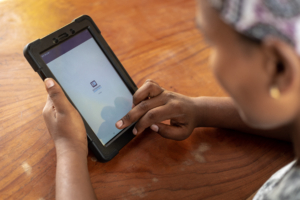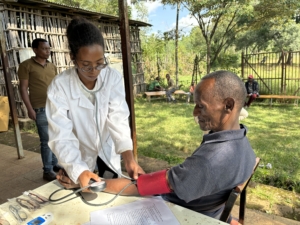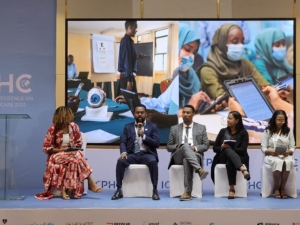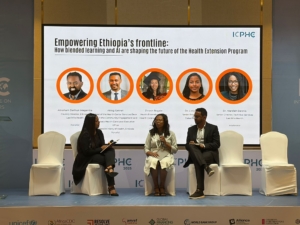Ethiopian government highlights innovations for its community health workforce at the International Conference on Primary Health Care
In recent years, technology has revolutionized learning approaches. Today, artificial intelligence tools are changing how people work. But the reach of digital innovations and AI is extending far beyond office tasks, transforming sectors like healthcare to drive meaningful change. At the third International Conference on Primary Health Care (ICPHC), hosted in Ethiopia, leaders from government, philanthropy and healthcare discussed how AI and blended learning are shaping the future of Ethiopia’s highly respected Health Extension Program (HEP).

A community health worker uses her tablet to access digital resources from the blended training module.
The HEP was launched in 2003 to deliver essential health services to communities across the country, driven by a legion of 40,000 community health workers (known nationally as health extension workers). The program has been named a global exemplar for its contributions to dramatic reductions in child and maternal mortality.
Responding to the need to upskill community health workers regularly, in an efficient and effective manner, Ethiopia’s Ministry of Health partnered with Last Mile Health in 2021 to design and scale an innovative blended learning approach for community health workers’ regular in-service training. The approach combines digital and in-person sessions to maximize learner gains while driving down costs. Joining the effort, Gates Foundation’s CEO Roundtable brought together top pharmaceutical companies to support Ethiopia’s innovations by providing technical expertise and resources.

Community health worker Zinash Bogale measures a patient’s blood pressure, part of the skillset she acquired in NCD training.
The partnership has already trained over 20,000 health extension workers. Recently, the partners launched the country’s first-ever training on non-communicable diseases (NCDs) for the community health workforce in response to the growing burden of NCDs in Ethiopia. And this year, they piloted a new innovation: a call center for community health workers providing standardized, AI-powered guidance on case management.
Four years on from the partnership’s launch, the session on community health worker training at ICPHC was a critical opportunity to discuss lessons learned and outline next steps for achieving even greater impact. “Community health workers focus on prevention: catching illnesses early, before they become serious,” explained Zinash Bogale, a health extension worker who has completed the training in NCDs and uses her new knowledge to screen and treat patients in her rural community. “When we do that, people recover faster and spend less on treatment. That means we’re not just helping our community stay healthy–-we also help prevent families from falling deeper into poverty.”
Speaking on behalf of Last Mile Health, the organization’s Ethiopia Country Director, Abraham Zerihun Megentta, said, “AI and blended learning are transforming how we upskill Ethiopia’s 40,000 health extension workers, making it more impactful, more efficient, and ready for national scale.”
Aklog Getnet, Head of the Health Center Services Desk at Ethiopia’s Federal Ministry of Health, testified to the value of these innovations: “In today’s evolving funding landscape, investing in interventions that improve the quality of care while reducing costs is exactly what governments should prioritize. That’s why we’re working to scale up the use of AI-powered assistants to provide real-time guidance to frontline health workers.”
Dr. Lidiya Tefera, Senior Program Officer with the Gates Foundation, agreed. “Investing in Ethiopia’s community health workforce through blended learning and AI is not just a smart use of resources: it’s a bold step toward equitable, scalable, and sustainable healthcare […] that puts innovation in the hands of those closest to the communities they serve.”
Concluding the session, moderator Dr. Mardieh Dennis, Last Mile Health’s Senior Director, Technical Services, said, “The success of Ethiopia’s blended learning and AI-powered Health Extension Program is a powerful example of how technology can transform frontline care. As we work across countries to strengthen community health systems, this model shows that digital innovation, when paired with strong government leadership, can deliver scalable, cost-effective, and equitable health solutions.”
Amidst cross-cutting crises, including deepening foreign aid cuts, it is essential that philanthropy continues to invest in community health innovations that are proven to work. Together, the Ministry of Health of Ethiopia and partners like Last Mile Health, the CEO Roundtable, and pharmaceutical companies have proven the scale and breadth of innovation that can be driven forward through cross-sectoral partnerships, helping to empower the frontline of health services and save lives in the most remote communities.






